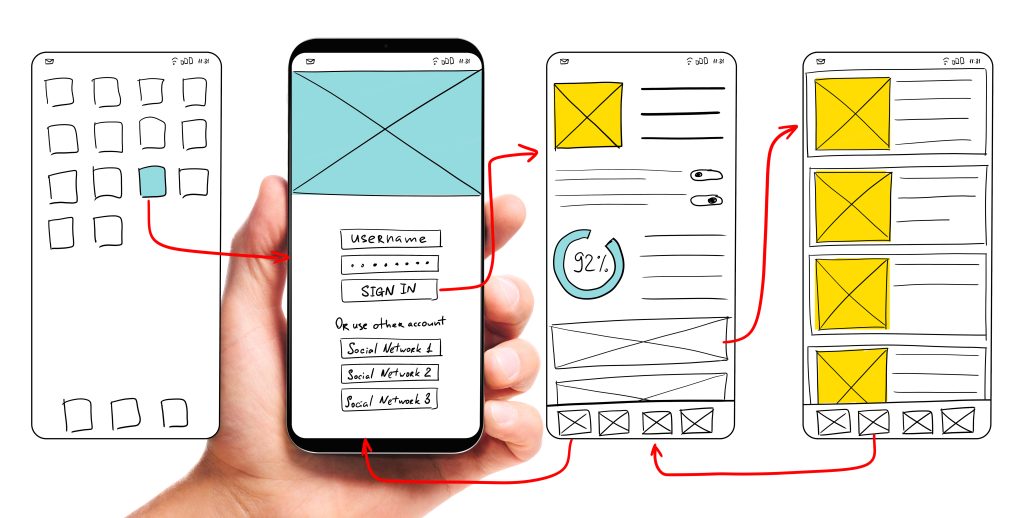In 2024, the average smartphone user spent over 5 hours daily on mobile apps, more time than they spent sleeping in some cases. This staggering statistic reveals a fundamental shift in how consumers interact with businesses.
Yet, here’s the paradox: while 88% of mobile time is spent in apps, only the top apps capture meaningful engagement. Think of the mobile app landscape like a crowded marketplace. Having a generic stall that looks like everyone else’s means you’re invisible.
But a custom-designed space that reflects your brand’s unique personality and caters specifically to your customers’ needs? That’s where the magic happens. This is precisely why forward-thinking businesses are turning to custom mobile app development services to create distinctive digital experiences that don’t just exist in the app stores but actively drive business growth and customer loyalty.
Precision-Engineered User Experiences That Actually Convert
Generic, template-based apps operate on assumptions about what users might need. Custom mobile apps, however, are built on data about what your specific users actually do.
Consider this: a retail business might discover through analytics that 70% of its customers abandon purchases when faced with a five-step checkout process. A custom app can engineer this down to two steps, incorporating saved payment methods, one-tap reordering, and biometric authentication specifically for their audience.
This precision extends to micro-interactions. Custom development allows you to optimize every swipe, tap, and transition based on how your users naturally navigate. When a fintech company builds a custom app, it can design gesture controls for frequent transactions, swipe right to pay a recurring bill, and long-press to check account balance, creating muscle memory that keeps users engaged. These aren’t features you’ll find in off-the-shelf solutions; they’re competitive advantages coded specifically for your business model.
Seamless Integration With Your Existing Technology Ecosystem
Here’s a reality that template apps rarely address: your business doesn’t operate in isolation. You have CRM systems, inventory management software, analytics platforms, payment gateways, and legacy databases that need to communicate seamlessly. Custom mobile apps act as the orchestration layer that brings this complex symphony together.
A manufacturing business, for instance, might need its mobile app to pull real-time data from IoT sensors on the factory floor, cross-reference it with ERP systems, and display actionable insights to managers, all while maintaining connections to HR systems for staff scheduling.
This level of integration isn’t just convenient; it eliminates the data silos that plague businesses using disconnected tools. When your mobile app can trigger automated workflows across multiple systems like updating inventory, notifying suppliers, and adjusting production schedules simultaneously, you’re not just digitizing processes; you’re transforming operational efficiency.
AI-Powered Personalization That Evolves With Your Customers
The integration of artificial intelligence in custom mobile app development has moved beyond chatbots and into predictive business intelligence. Modern custom apps leverage AI development services to create genuinely adaptive experiences. A custom-built e-commerce app can deploy machine learning algorithms that analyze individual browsing patterns, purchase history, seasonal trends, and even the time of day to dynamically adjust what products appear on each user’s home screen.
But the real power lies in AI’s ability to predict friction points before they cause churn. Advanced custom apps use sentiment analysis on support interactions, behavioral pattern recognition, and anomaly detection to identify when a customer is likely to disengage and then automatically trigger personalized retention strategies.
This might mean serving a customized discount, simplifying a confusing workflow, or proactively offering support. These AI capabilities require access to your proprietary data and business logic, something only custom development can properly implement while maintaining data privacy and competitive secrecy.
Ownership of Your Digital Assets and Customer Relationships
When you build on third-party platforms or use white-labeled solutions, you’re essentially renting space in someone else’s ecosystem. Algorithm changes, policy updates, or platform shutdowns can devastate your user base overnight. Custom mobile apps give you complete ownership of the codebase, the data, the user experience, and, critically, the customer relationship.
This ownership translates to long-term cost efficiency. While custom development requires higher upfront investment, you’re not paying recurring licensing fees, per-user charges, or transaction percentages that erode margins over time.
More importantly, you control the roadmap. When market conditions shift or customer preferences evolve, you can pivot immediately without waiting for a platform provider to add features or seeking approval for modifications.
Scalability Designed for Your Growth Trajectory
Generic solutions scale horizontally; they’re built to accommodate more users doing the same basic things. Custom apps are strategically architected from day one to handle your specific growth patterns. If your business model involves seasonal spikes, geographic expansion, or adding entirely new service lines, custom development allows you to build scalable infrastructure that anticipates these needs.
A logistics company expanding from regional to national operations needs an app that can handle 10x the GPS tracking points, integrate with new regional partners, and support multi-language interfaces, all without performance degradation.
Custom architecture allows you to choose the right database structures, caching strategies, and server configurations for your exact use case. You’re not forced into one-size-fits-all solutions that either overpay for unused capacity or crash during your peak season.
Competitive Differentiation in Saturated Markets
In markets where products and pricing have reached parity, customer experience becomes the battleground. Custom mobile apps allow you to encode your unique value proposition directly into the user interface. A premium hotel chain can build an app that doesn’t just book rooms but creates an entire pre-arrival experience, virtual concierge consultations, personalized itinerary planning, and seamless room customization that reinforces their luxury positioning in ways a generic booking app never could.
This differentiation extends to innovation velocity. When competitors are constrained by what their chosen platform supports, custom development lets you pioneer features that define new category standards. Being the first finance app to offer voice-activated portfolio rebalancing or the first healthcare app to integrate wearable device data for preventive diagnostics establishes market leadership that’s difficult to replicate.
Security and Compliance Tailored to Your Industry
Healthcare providers need HIPAA compliance. Financial institutions require PCI DSS certification. Government contractors must meet FedRAMP standards. Custom mobile app development allows you to architect security measures specific to your regulatory environment from the ground up, rather than hoping a generic solution’s security model aligns with your obligations.
Beyond compliance, custom apps enable sophisticated security layers matched to your threat model. Banks can implement behavioral biometrics that detect account takeovers by analyzing typing patterns and navigation habits.
Retail apps can use device fingerprinting and fraud detection algorithms trained on their specific transaction data. This granular approach to security isn’t just about preventing breaches, it’s about building customer trust through demonstrable protection of their data.
Conclusion: The Investment That Keeps Delivering Returns
The businesses thriving in today’s mobile-first economy aren’t those with apps; they’re those with the right apps and of course the expert Hire mobile app developers. Custom mobile app development represents a strategic investment in owned digital assets that compound value over time.
Every user interaction generates proprietary data, every feature refinement strengthens competitive moats, and every integration deepens operational efficiency. In an era where digital experience often is the product, custom development isn’t an IT expense; it’s the foundation of modern business strategy.
Caroline is doing her graduation in IT from the University of South California but keens to work as a freelance blogger. She loves to write on the latest information about IoT, technology, and business. She has innovative ideas and shares her experience with her readers.






